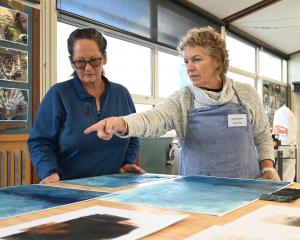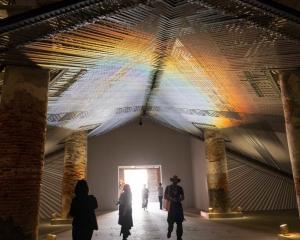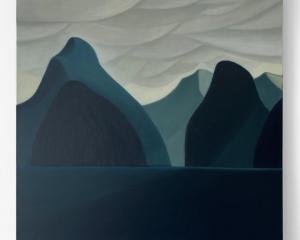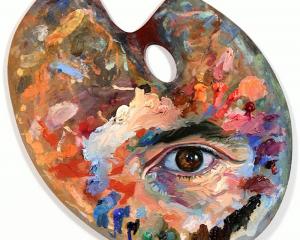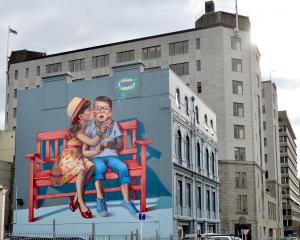Occasionally Dunedin sprouts remarkable arts communities in which people flourish - the "Dunedin Sound" of the 1980s, R. N. Field and his art students in the 1930s, and Rosalie and Patric Carey's Globe Theatre in the 1960s.
Although the Careys left in 1973, the Globe community has continued staging plays in the historic buildings and will celebrate its 50th anniversary this weekend.
Patric Carey, an Irish-born theatre director and designer, and his New Zealand-born wife Rosalie, an actress and teacher, expanded the horizons of thousands of people from all walks of life, not only in theatre, but in art and ideas.
Former Otago Daily Times theatre reviewer Keith Harrison who, with his wife Pat, was involved from the early days before the theatre was built, explains.
"Patric was prepared to experiment with little-known European writers, people who were starting to make headlines in Europe. Looking back, it was an extremely enriching experience, though I probably wasn't aware of it at the time. He encouraged us to look at meaning and intent and what the author was at, and often explored other writers around a particular writer. It was very broad."
The fact that such plays were done at all was a huge contribution, he said.
For Carey, theatre was a forum for debate and a place to do things rather than an entertainment business.
Productions included works by avant-garde playwrights such as Eugene Ionesco, Samuel Beckett, Jean Paul Sartre, Jean Genet and Edward Albee from the theatre of the absurd; Tennessee Williams, Arnold Wesker and classic writers like Chekhov, Ibsen, George Bernard Shaw and Sean O'Casey; Shakespeare and other Elizabethans; the ancient Greek dramatists, and experimental New Zealand plays including those by poet James K. Baxter, whom Carey had encouraged to to try his hand at writing plays.
Artists such as Colin McCahon and Ralph Hotere exhibited there and Hotere even designed sets and costumes, most notably for Baxter's Temptations of Oedipus.
Actor and director Louise Petherbridge, who returned to Dunedin in 1972 after a career acting and teaching drama in London, said it was marvellous to find a place putting on plays that wouldn't normally be done, and being welcomed to experiment.
"I said I would like to do [Harold Pinter's] Landscape and Silence but I thought it would empty the theatre. Patric said 'Oh, no problem, come and do it'.
"He almost welcomed the fact that the theatre would be emptied, but it didn't empty the theatre. It got good houses."
Patric Carey had come to Dunedin in 1956 as professional director for the Repertory Society but he and Rosalie started doing their own productions the following year.
They staged many of the ancient Greek plays in gardens, churches, the university quadrangle or hired venues, and then in one of the large rooms in their London St home.
With the help of supporters and friends, in 1961 they built the theatre on to the house and the room formerly used to present plays became the backstage area.
There was nothing else like it in New Zealand, according to Dallas Fairmaid, who acted in many of the early productions.
Professional theatre in other cities hadn't started at the time.
"Patric was terribly inspiring. He knew who would be good in a part and would give you directions but he would never push you. He would leave you to develop yourself as well," she said.
Besides discussions about the meanings of the play, casting the right people was an important strategy in Carey's methods.
It was a standing joke that he would look down from the lighting box, and select people from the audience for his next play.
According to Harry Love, another Globe stalwart and now a playwright and director, he had a way of finding things in people they didn't know themselves.
One memorable production of Beckett's absurdist Waiting for Godot featured psychologist Basil James and statistician Geoffrey Jowett in the lead roles.
The Globe staged plays, dance, mime, poetry, concerts and art exhibitions, and many people spent hours working on productions or other projects.
However, for many people - artists, poets and writers, academics, students and ordinary people - it was the stimulating, provocative and erudite conversations that went on before and after plays, and often over dinner.
Marilyn Parker, a student at the time, said it seemed a sophisticated, grown-up world. "Patric took it all so seriously and he took us seriously," she said.
"You'd be there sewing costumes or scrubbing the floor and there'd always be 'stay to dinner'. You'd never know who might be there for dinner or what might be talked about. I've never had conversation or been on the edge of conversation like it - it was conversation as an art, but it was also conversation about things people knew about and cared about and happened to express wittily and stylishly."
When Simon O'Connor, now a theatre practitioner and playwright, arrived from the North Island in the late 1960s looking for theatre training, Carey asked him why.
"I didn't really know but I think I said something like what was on offer from jobs out in the world for 18-year-olds at the time seemed so strait-laced and constrained and theatre seemed richly chaotic by comparison and that's what attracted me," O'Connor said.
"Patric leapt on this word 'chaotic' and started talking about the Greeks and Chaos. I just sat and listened. I hadn't been exposed to that stuff before," he said.
He may not have received a formal theatre training, but "what I got from both the Careys in slightly different ways was this terrific exposure to what was current in the theatre and what was exciting about theatre in terms of its connection with wider society and its historical context," he said.
"I think I got a sense of commitment from them, that what they were doing was special, this was important stuff to be involved in," he said.
While Patric inspired, enriched and broadened the horizons of people he came in contact with, Rosalie Carey looked after the practical side of the theatre, creating costumes, teaching, keeping tabs on the finances, and feeding numerous helpers as well as taking the occasional role on stage.
She was notable for giving anyone who turned up at the theatre a job to do.
But it was she who turned the Globe into a family, according to O'Connor.
She was welcoming and generated a real sense of community and nurtured a generation of young people.
In the 2010 new year's honours, Rosalie Carey, who now lives in Whangarei, was made a Member of the New Zealand Order of Merit.
Patric Carey died in 2006.
After the Careys left at the end of 1973, the Globe continued the tradition of staging interesting plays under artistic directors, who included Mary Middleditch, John Caselberg, Rowena Cullen, and Renee.
At present it is run by a committee rather than an artistic director.
It continues to present several productions a year and manages to maintain the historic buildings and garden.
The octagonal theatre, inspired by Elizabethan theatres, was designed by Niel Wales, a partner of the firm Mason and Wales.
The founder of the firm, William Mason, New Zealand's first architect and Dunedin mayor, had built the house for himself almost 100 years earlier.
The theatre and house are now a category 1 historic place.

